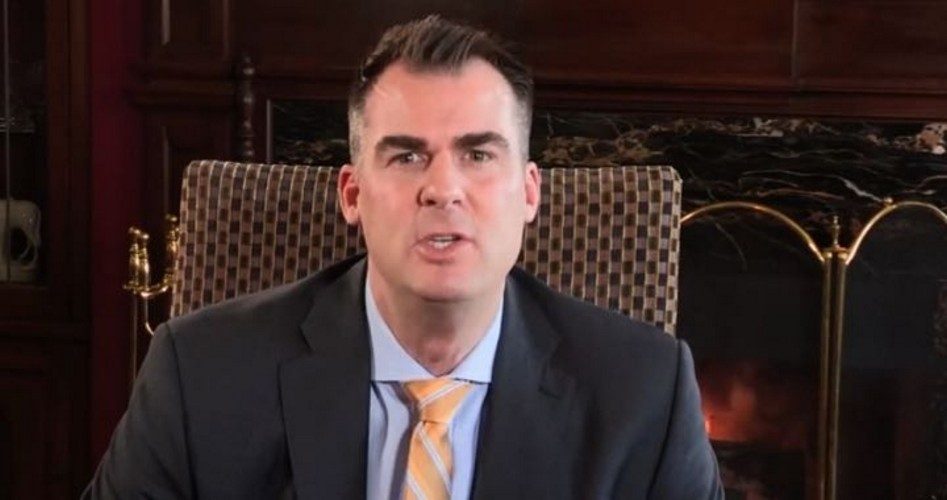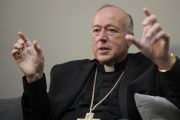
Oklahoma Governor Kevin Stitt (shown), a Republican, is scheduled to speak at Guts Church in Tulsa on September 22, to a men’s group on the topic of serving God, leadership, and raising children.
The planned event has drawn the ire of the Freedom From Religion Foundation (FFRF), which contends that a speech by the governor of Oklahoma at a religious event constitutes a violation of the constitutional prohibition against the government from establishing a religion.
“When you speak as governor, you are speaking as the government,” Ryan Jayne, an attorney for FFRF, said in a letter to Stitt. Jayne added, “Using the office of the governor to promote a specific religious mission is unconstitutional and sends a direct message to the 30 percent of non-Christian adults who you serve that they have the wrong religion, and that only your personal god can solve Oklahoma’s problems.”
Jayne said that it was the second time in the past nine months (Stitt took office in January of this year) that the organization of “freethinkers” (which they define as atheists and agnostics) has warned Stitt not to use his position as governor to promote religion. The protests of FFRF are reminiscent of when Apollo 8 astronauts read the Creation story from the Book of Genesis while being the first humans to orbit the moon on Christmas Day, 1968. Prominent atheist and communist Madalyn Murray O’Hair promptly sued NASA, arguing that they were employees of the federal government, and therefore it was a violation of “separation of church and state.”
“We are telling Gov. Stitt, as we tell all pious politicians: ‘Get off your knees and get to work,’” added FFRF Co-President Annie Laurie Gaylor. “It’s not OK in Oklahoma or any other state for public officials to misuse their office to promote religion.”
In a press release, FFRF argued that Stitt was “leveraging his taxpayer-funded office to advance his personal religious goals.”
FFRF previously put Stitt on notice, Jayne recalled, when Stitt hosted an inaugural prayer service at which a pastor from Guts Church both prayed and preached a sermon. “If he continues to use his position to promote religion, we would certainly consider other legal options,” including a lawsuit, Jayne warned.
In contrast, Oklahoma’s attorney general, Mike Hunter, said that Stitt’s speaking to a church group raised no constitutional questions. “Just because you’re elected to public office doesn’t mean that you forfeit your religious beliefs under the First Amendment,” Hunter said. “I think that’s nonsense.”
There are several problems with the position taken by FFRF concerning Governor Stitt’s talk to a church. Taken to its logical conclusion, no person employed by any level of government or holding any elected office at any level of government could ever speak to a religious gathering, unless the person’s position in the government was hidden. To put it simply, it has never been that way in the past. For example, Guts Church previously heard from former Oklahoma football coach Bob Stoops. (Although Stoops retired as the Sooners’ coach in the summer of 2017, he was still on the university payroll at the time). The legendary OU football coach Bud Wilkinson taught Sunday School in Norman in the 1950s. Was that a violation of “separation of church and state?” The reality is that it is rather impossible for a person to cease to be a governor, a football coach at a tax-supported institution, or a janitor in a court house when he lives his daily life. To be blunt, it is not any of the FFRF’s business what Stitt, or any other public official has to say about religious topics. It is not like he is using the power of his office to force anyone attend the talk.
As Hunter said, a person retains his constitutional rights, including religious liberty, upon taking office, and is free to practice his religion while in office, like any other citizen.
Beyond that, the phrase, “separation of church and state” does not appear anywhere in the Constitution, including in the First Amendment. The phrase is from a letter that President Thomas Jefferson wrote the Danbury Baptist Association of Connecticut early in his presidency. It appears that the Baptists were concerned about a rumor they had heard that the Congress was going to make the Congregational Church the Established Church of the United States. Jefferson assured them that that was impossible as the First Amendment had “erected a wall of separation” between the federal government and the church, prohibiting federal officials from interfering in the affairs of the church.
At the time, it was understood that the First Amendment only prohibited Congress from creating a national religion. It did not keep the states from establishing their own religions, as was the case at the time in Connecticut when Jefferson penned the letter. That was the point of the Baptists’ concern — they believed they had been abused by the Congregationalists in Connecticut and did not want them to achieve the status as America’s national church.
The reality is that shortly after Jefferson wrote the Baptists, he attended church services, held in the Capitol of the United States! In contrast, Governor Stitt is simply exercising his religious liberty and his freedom of speech to talk to a church that has invited him to speak. In other words, the FFRF’s whole argument is rather lame.
Image of Kevin Stitt: Screenshot from governor.ok.gov
Steve Byas is a university instructor and author of History’s Greatest Libels. He may be contacted at [email protected]


